What Is the 1994 Washington Quarter Made Of?
The standard 1994 Washington quarter is made of clad composition, which includes 91.67% copper and 8.33% nickel. Moreover, there’s a 1994 silver-proof Washington quarter that is made of 90% silver and 10% copper. This composition is the same as the Washington quarters issued from 1932 to 1964.
The face value of the 1994 Washington quarter is 25 cents. Its mass is 5.67 grams, its diameter is 24.3 mm, and a reeded edge.
The Washington quarter was first struck in 1932. It was the same year when George Washington would have celebrated his 200th birthday. Adding George Washington to the quarter is a way to honor the first president of the United States.

The obverse includes the left profile of George Washington. Beneath his image is the year of minting, which is 1994. You will also read the “IN GOD WE TRUST” motto of the US under his chin.
You will find the word “LIBERTY” arching on top of Washington’s image. Just adjacent to Washington’s pigtail is the mint mark, which can be D, P, S, or no mint mark.
On the reverse, you’ll find the beautiful eagle spreading its wings. It is perched on a bundle of arrows. Below the arrows are olive branches.
The inscriptions include the following:
- UNITED STATES OF AMERICA
- E PLURIBUS UNUM
- QUARTER DOLLAR
John Flanagan designed the Washington quarter after winning the competition held by the US Mint. The selection of the artist and the design for the Washington quarter were controversial. After some protests and arguments, Flanagan’s design became the face of the Washington quarter.
1994 Washington Quarter Varieties
The 1994 Washington quarter has different varieties. These varieties differ based on their mint marks and where they are struck. The US Mint produced the 1994-S, 1994-D, 1994-P, 1994-S proof, and 1994-S silver proof Washington quarter.
Aside from the standard Washington quarter varieties, there are also those that come with errors. This made the coin unique and different.
Here are some of the most common 1994 Washington quarter varieties you should know:
1994 D Washington Quarter
Year of minting: 1994
Mint Mark: D
Place of minting: Denver
Quantity produced: 880,034,110
Face Value: $0.25 (twenty-five cent)
Price: 25 cents to $10.00 (or more)
Mass: 5.67 grams
Edge: Reeded
Designer: John Flanagan
Composition: 91.67% Copper and 8.33% Nickel
Diameter: 24.3 millimeters
Thickness: 1.75 millimeters
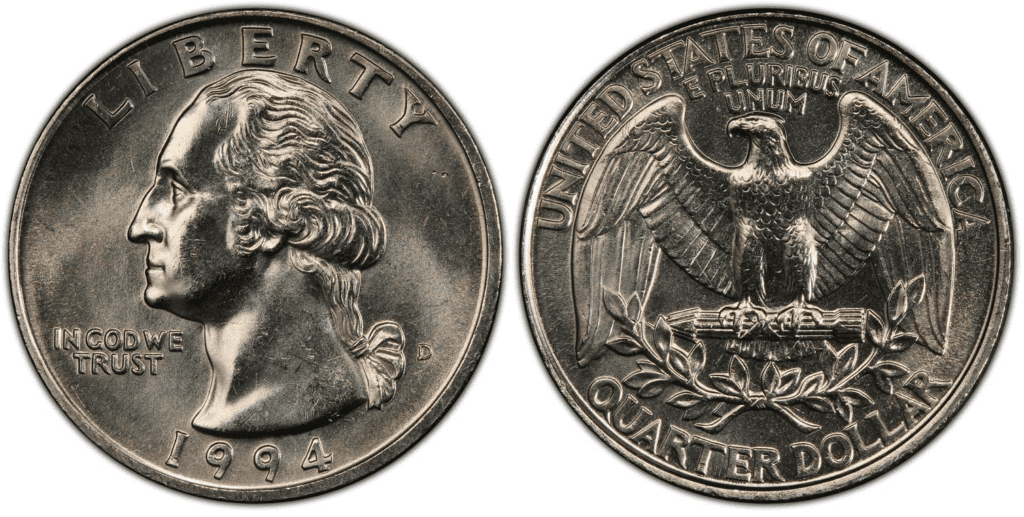
Among the different varieties of the 1994 quarter, it is the D quarter variety that has the highest number of mintages. With over 880 million D-quarter coins, it is something that you can easily find in coin exchanges and even in your pocket.
The 1994-D Washington quarter is made in the Denver Mint. You can sell this coin for up to $10 or more, depending on the condition and whether your coin is rare or not.
1994 P Washington Quarter
Year of minting: 1994
Mint Mark: P or no mint mark
Place of minting: Philadelphia
Quantity produced: 825,600,000
Face Value: $0.25 (twenty-five cent)
Price: 25 cents to $10.00 (or more)
Mass: 5.67 grams
Edge: Reeded
Designer: John Flanagan
Composition: 91.67% Copper and 8.33% Nickel
Diameter: 24.3 millimeters
Thickness: 1.75 millimeters
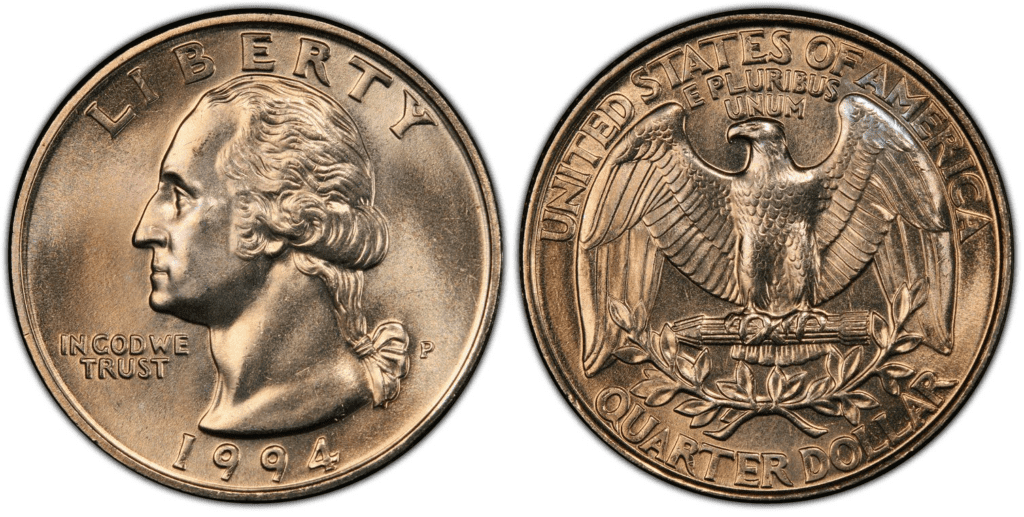
The 1994-P quarter coin was made in the Philadelphia Mint. There were more than 825 million of these coins produced in 1994. You can sell this coin from $0.25 to $10.
1994 S Washington Quarters
Year of minting: 1994
Mint Mark: S
Place of minting: San Francisco
Quantity produced: 2,484,594
Face Value: $0.25 (twenty-five cent)
Price: 25 cents to $5 (or more)
Mass: 5.67 grams
Edge: Reeded
Designer: John Flanagan
Composition: 91.67% Copper and 8.33% Nickel
Diameter: 24.3 millimeters
Thickness: 1.75 millimeters
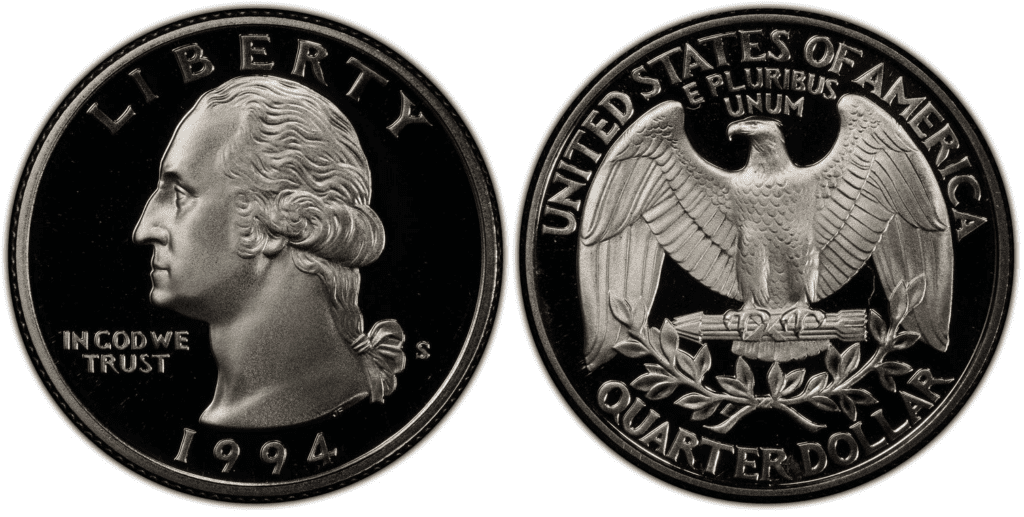
The San Francisco Mint is unique from other Minting Centers of the United States. They produce coins, not for circulation and public use, but rather the coins they make are for collectors.
As you may have noticed, there are only 2.4 million 1994 quarter coins made by the San Francisco Mint. The reason is that this mint produces proof coins that consume more time to manufacture. Proof coins are more beautiful, detailed, and shinier compared to standard struck quarter coins. You can buy or sell this coin for $0.25 to $12.
1994 S Washington Quarters (Silver Proof)
Year of minting: 1994
Mint Mark: S
Place of minting: San Francisco
Quantity produced: 785,329
Face Value: $0.25 (twenty-five cent)
Price: 25 cents – $12 (or more)
Mass: 5.67 grams
Edge: Reeded
Designer: John Flanagan
Composition: 91.67% Copper and 8.33% Nickel
Diameter: 24.3 millimeters
Thickness: 1.75 millimeters
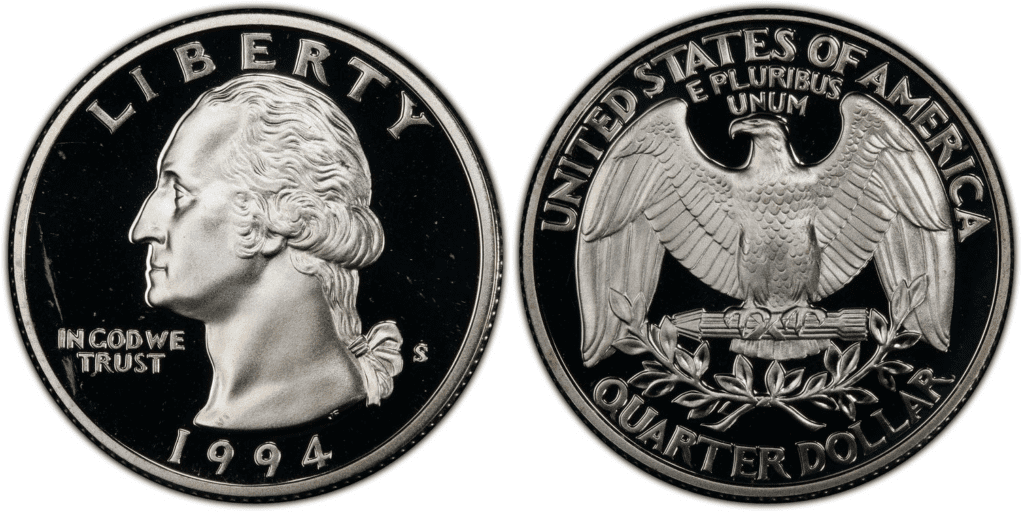
The 1994 Washington quarter isn’t just made of base metals. After many decades, the US Mint started to produce silver quarters and in 1994, there are Washington silver proof coins that are highly valuable.
On average, the silver 1994 quarter is about 25 cents and $12 in value. There are only about 785 thousand S silver-proof quarter coins made in 1994.
List Of 1994 Washington Quarter Errors
Aside from the standard coins, there are also some Washington quarter errors made in 1994. As you know, there are millions of Washington quarters, so it is not surprising to know that there are those coins that were made with errors.
Mint-made errors can happen due to the die, planchet, and strike. The coinage equipment undergoes a lot of wear and tear each time it is used. This is the reason that at any time, without proper maintenance, some parts of the minting equipment may fail and cause errors to happen.
Some of the common 1994 Washington quarter errors of minting include the following:
- Blank planchet
- Clipped planchet
- Doubled die
- Die clash
- Die cracks
- Mules
- Misaligned dies
- Broadstrike
- Die cap
- Brokerage
Here’s an example of a 1994 quarter error in minting:

In this error, there’s a machine doubling. As a result, you find a faded number after the 4 in 1994.
Another example is this coin with reverse struck through error. During the minting, there’s a foreign material that got stuck between the planchet and the die. As a result, you’ll find some dots on the coin:
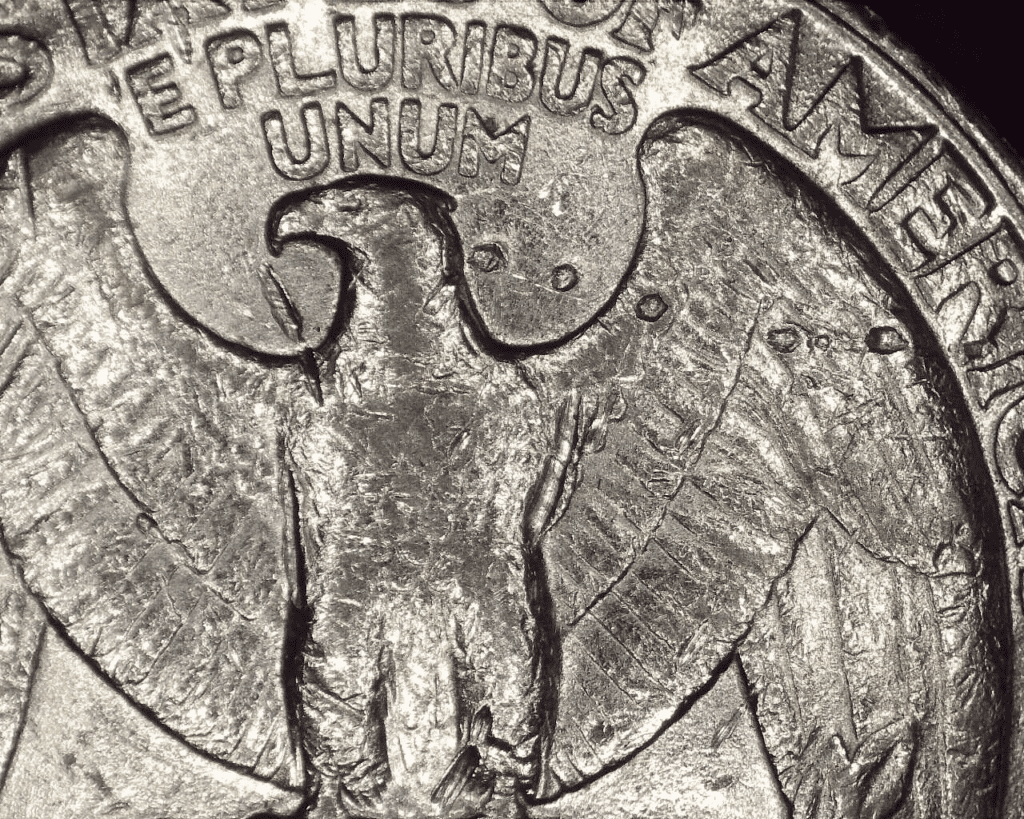
How Much Is 1994 Washington Quarter Worth Today?
The face value of the 1994 Washington quarter is $0.25. Its melt value is $0.05. While the standard Washington quarter is not that valuable, the silver variety can be more expensive.
For example, the 1994 silver Washington quarter can be sold for as much as $12. Its melt value is even higher at around $18 to $20. Please note that the melt value is dependent on the market value of silver, which can go up and down on a daily basis.
Although the 1994 silver Washington quarter may not be that valuable, there are those that command a higher price. Some are even hundreds of dollars in value.
To give you an idea here’s a 1994 Washington Quarter values chart:
| Coin | Condition | Grade | Mintage | Value |
| 1994 D Washington Quarter | Circulated/mint | Not graded | 880,034,110 | 25 cents to $10.00 (or more) |
| 1994 D Washington Quarter | Uncirculated/mint | MS-66 | 880,034,110 | $17 to $128 |
| 1994 D Washington Quarter | Uncirculated/mint | MS-67 | 880,034,110 | $110-$1,020 |
| 1994 P Washington Quarter | Circulated/mint | Not graded | 825,600,000 | 25 cents to $10.00
|
| 1994 P Washington Quarter | Uncirculated/mint | MS-65 | 825,600,000 | $3 |
| 1994 P Washington Quarter | Uncirculated/mint | MS-66 | 825,600,000 | $49 to $104 |
| 1994 P Washington Quarter | Uncirculated/mint | MS-67 | 825,600,000 | $55 to $504 |
| 1994 S Washington Quarter | Circulated/proof | Not graded | 2,484,594 | 25 cents to $5 |
| 1994 S Washington Quarter | Uncirculated/proof | PR-68 | 2,484,594 | $11 |
| 1994 S Washington Quarter | Uncirculated/proof | PR-69 | 2,484,594 | $8 to $19 |
| 1994 S Washington Quarter | Uncirculated/proof | PR-70 | 2,484,594 | $7 to $35 |
| 1994 S Washington Quarter (Silver proof) | Uncirculated/Proof | Not graded | 785,329
|
25 cents to $12 |
| 1994 S Washington Quarter (Silver proof) | Uncirculated/Proof | PR-68 | 785,329
|
$14 to $15 |
| 1994 S Washington Quarter (Silver proof) | Uncirculated/Proof | PR-69 | 785,329
|
$7 to $43 |
| 1994 S Washington Quarter (Silver proof) | Uncirculated/Proof | PR-70 | 785,329
|
$19 to $353 |
How Does The Grading System Work?
The Sheldon Scale is used by numismatists to provide a numerical value to coins. The Sheldon Scale goes from poor (P-1) to perfect mint state (P-1) (MS-70). Coins were originally evaluated using words to reflect their condition (Good, Fair, Excellent, Etc.). Unfortunately, coin collectors and dealers had different ideas about what each of these terms represent.
Professional numismatists joined together in the 1970s and established CoinGrading standards. These numismatists now assign grades at key places on the seventy-point scale, using the most regularly utilized numeric points in conjunction with the original adjective grade. The following are the most common coin grades:
-
-
- (P-1) Poor – Indistinguishable and probably damaged; if used, must have a date and mintmark; otherwise, rather battered.
- (FR-2) Fair – Nearly smooth, but without the damage that a coin graded Poor often possesses. The coin must have enough detail to be identified.
- (G-4) Fair – Inscriptions have merged into the rims in some areas, and important elements have been mostly erased.
- (VG-8) Very Good- A little weathered, but all of the primary design elements are visible, albeit faintly. There is little if any, central detail left.
- (F-12) Good – The item is very worn, yet the wear is even, and the overall design details stand out clearly. Rims are almost completely isolated from the field.
- (VF-20) Very Fine – Moderately weathered, with some finer features still visible. The motto or all letters of LIBERTY are readable. Both sides of the coin have entire rims that are separated from the field.
- (EF-40) Extremely Fine – Gently used; all gadgets are visible, and the most important ones are bold. The finer details are bold and clear, however, light wear may be seen.
- (AU-50) Uncirculated – Slight evidence of wear on the coin’s design’s high points; may have contact marks; eye appeal should be adequate.
- (AU-58) Uncirculated Choice – Slight traces of wear, no severe contact marks, almost full mint shine, and great eye appeal.
- (MS-60) Mint State Basal – Strictly uncirculated; no indication of wear on the coin’s highest points, but an unsightly coin with reduced luster, visible contact marks, hairlines, and other flaws.
- (MS-63) Mint State Acceptable – Uncirculated, but with contact scratches and nicks, little reduced shine, but otherwise appealing appearance. The strike is weak to average.
- (MS-65) Mint State Choice – Uncirculated with great mint shine, very little contact blemishes, and exceptional eye appeal. The strike is unusually severe.
- (MS-68) Mint State Premium Quality – Uncirculated with superb luster, no obvious contact marks to the naked eye, and exceptional eye appeal. The strike is quick and appealing.
- (MS-69) Almost Perfect Mint State – Uncirculated with perfect brilliance, a sharp and appealing strike, and extremely good eye appeal. A near-perfect coin with minor imperfections in the planchet, strike, and contact markings (seen only under 8x magnification).
- (MS-70) Mint State Perfect – Under 8x magnification, there are no tiny imperfections discernible; the strike is crisp, and the coin is perfectly centered on a beautiful planchet. Rarely seen on a coin, this coin is bright and whole, with original luster and exceptional eye appeal.
-
Where To Buy Or Sell 1994 Washington Quarter?
FAQs
How do I know if my 1994 P quarter has an error?
Most errors are obvious. With just one look, you can easily find them. If you are familiar with the correct look of a 1994 P quarter, you should be able to easily distinguish a coin with errors from those coins without errors.
If you wish to confirm, you can also seek the help of a qualified and professional coin appraiser.
What is the strike-double in the 1994-D Washington Quarter?
The strike-double in the 1994-D Washington quarter is caused by the die striking the planchet twice. As a result, you’ll see a doubling of the engraved elements on the coin.
Which 1994 quarters should I keep?
The 1994 quarters that you should keep are the ones with a grade of at least MS-65 or PR-68. These coins are quite rare due to their top condition. Moreover, you may also keep 1994 quarters that have unique errors and attributes.
